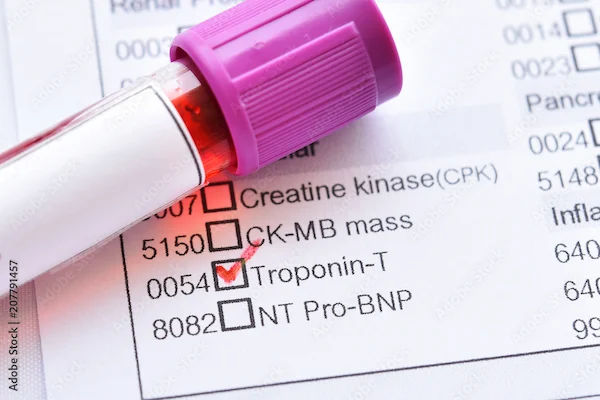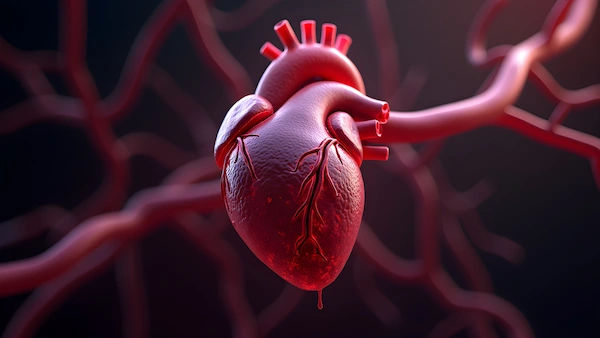- male
- 50 Years
- 29/01/2025
I just got my results from a full body check-up, and it turns out my high sensitivity C-reactive protein (HSCRP) level is at 20 mgL. Is this something I should be worried about? Do I need to be on any medication? Would love your thoughts on this.
Answered by 1 Apollo Doctors
based on your high sensitivity C-reactive protein (HS-CRP) level of >20 mgL, it indicates inflammation in your body. To lower your HS-CRP level and reduce inflammation, you can consider taking Atorvastatin 20mg once daily. Additionally, incorporating lifestyle changes such as regular exercise, healthy diet, and stress management can also help in reducing inflammation. Remember to follow up with your healthcare provider for monitoring your HS-CRP levels.
Dr. Chandra Suggests...
Consult a Cardiologist
Answered 04/07/2025
0
0

More Cardiology Health Queries
View allI'm looking at my lipid profile results, and I'm a bit concerned. My cholesterol is at 132, triglycerides are 227, LDL is 57, HDL is 30, and VLDL is 45. Do these numbers indicate any issues I should be aware of? Would appreciate some advice on how to improve them if necessary.
Triglyceride is derranged. Other reports are normal. Advised low fat diet, reduction of butter and ghee in diet, aerobic exercises also low dose of rosuvas 5mg is started and repeat lipid panel is advised after 3 months..
Answered by 1 Apollo Doctors
I'm really struggling and could use some advice. Ive been feeling exhausted for the past three years and I'm dealing with severe shortness of breath. My mornings start with a really bad headache, and my resting heart rate is consistently high, hovering around 100 to 110, and it shoots up to 180 to 200 just by climbing a single flight of stairs. My weight is normal, so Im confused about what might be causing this. I used to be pre-hypertensive with a blood pressure of 137 over 91, and then I was on Inderal la 20 in July and August of last year. Now, my BP usually sits in the 95 over 83 or 100 over 85 range when I'm resting, which makes me wonder why my pulse pressure is so low. I was diagnosed with allergic rhinitis and allergic bronchitis in January, and Ive been taking mondeslor for the past two months, but Im not seeing any improvement. Ive done a pulmonary function test, ECG, and echo, and they all came back normal. I don't have anxiety issues and generally, I'm a calm person. It's all pretty frustrating, and its impacting my everyday life. What could be going on?
It sounds like you are experiencing symptoms of fatigue, dyspnea, headaches, and low pulse pressure despite being on Inderal LA 20 for hypertension. Since your PFT, ECG, and echo results are normal, it is important to consider other possible causes for your symptoms. Given your history of allergic rhinitis and allergic bronchitis, it is possible that your symptoms could be related to an underlying respiratory issue. Considering your symptoms and medical history, I would recommend discussing with your doctor the possibility of trying a different medication for your allergic conditions. You may benefit from a nasal corticosteroid spray such as Flonase (fluticasone) for allergic rhinitis and an inhaled corticosteroid like Qvar (beclomethasone) for allergic bronchitis. These medications can help reduce inflammation in your airways and improve your breathing. In addition, since you are experiencing persistent headaches, your doctor may consider prescribing a medication like Propranolol (Inderal) at a higher dose to help with both your headaches and high heart rate. It is important to follow up with your doctor regularly to monitor your symptoms and adjust your treatment plan as needed. Overall, it is important to continue working closely with your healthcare provider to determine the underlying cause of your symptoms and find an appropriate treatment plan.
Answered by 1 Apollo Doctors
I'm a bit concerned about my heart rate. I had MVR surgery back in October 2019 and I've been on Cordarone, 100 mg, ever since. Recently, around the last month and a half, my heart rate has been hovering between 60 and 65 bpm. Is this a healthy heart rate for someone in my situation, or do I need to see a cardiologist for this?
From the information provided, your heart rate of 60-65 bpm is within the normal range for adults. However, since you are a heart failure patient with a history of MVR surgery and taking Cordarone 100 mg, it is important to monitor any changes in your heart rate closely. If you experience any symptoms such as dizziness, shortness of breath, chest pain, or fatigue along with the lower heart rate, it would be advisable to consult your cardiologist for further evaluation.
Answered by 1 Apollo Doctors
Disclaimer: Answers on Apollo 247 are not intended to replace your doctor advice. Always seek help of a professional doctor in case of an medical emergency or ailment.




